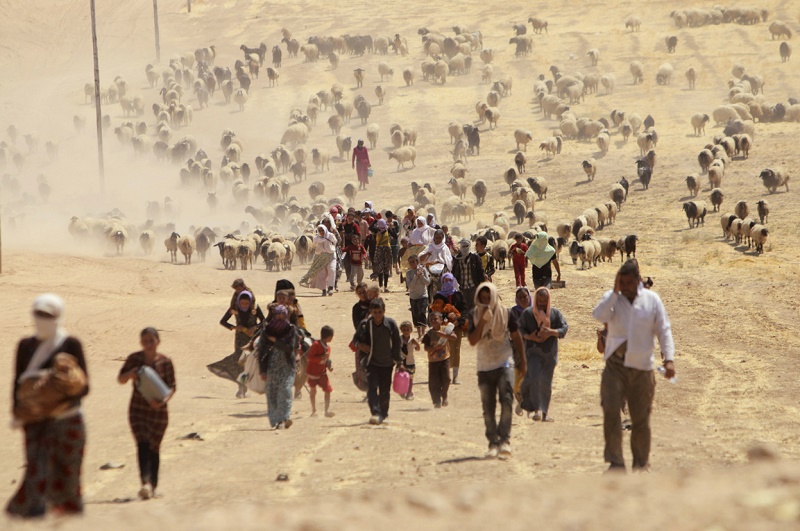
Religious and political leaders are calling for a stronger response from the international and Christian communities regarding the atrocities committed by Islamic State terrorists and the growing persecution of Christians who have lived in the Middle East for thousands of years.
On Wednesday, fighters from the Islamic State of Iraq and Syria, also known as the Islamic State of Iraq and the Levant, killed 150 women and underage girls that refused to perform sexual acts for them before burying the bodies in shallow graves in the Iraqi city of Fallujah.
Just a few hours later, a mass grave with 230 bodies was discovered in Syria's al-Keshkeyyi Desert near Deir Ezzor across the border from Iraq, according to the Syrian Observatory for Human Rights. All of those killed were members of the al-Shaitaat people and were killed by ISIS militants.
Meanwhile, in Baghdad, Islamic State soldiers forced hundreds of civilians in the town of al-Wafa, to leave their homes and threatened anyone who didn't leave their house with murder.
"The families, including women and children, were left in the desert despite the extreme cold weather," reveals a report from the Iraqi government, which goes on to say that an estimated 10 children have died due to inclement weather in the desert.
These recent and horrific murders are only a handful of the atrocities facing Iraqi religious minorities in the region. The New York Times reported that the Christian population in Iraq has dropped to 400,000 while more than 120,000 people have been displaced from ISIS terror. Those who choose to stay face tremendous persecution from the militants, who have captured large parts of Iraq and Syria in an attempt to establish a worldwide caliphate, or Islamic State.
According to Patriarch Louis Sako, the head of the Chaldean Catholic Church in Iraq, the current US-led coalition of airstrikes, which began in August, have done little to stop the radical Muslim group.
"Bombing is also killing people, destroying the infrastructure, houses, schools, churches," said Sako, according to Catholic news source Crux. "There's no military solution for the conflict, especially when there are no troops on the ground providing assistance."
Sako, who recently took part in a 48-hour pilgrimage to visit refugees who have been displaced by the violence, also said that the militants will only be completely expelled if the US coalition and the Iraqi central government choose to cooperate with one another.
He added that the international community has, for the most part, "turned its back" to what was happening in Iraq and Syria. He encouraged Christians to pray for those suffering in the Middle East, saying prayer is what keeps families surviving amidst the violent persecution.
"Christian families are an example," he said, "a light and hope for Muslim families because they do not practice monogamy, because they are the union of a man and a woman, because women have their role and dignity. I have heard many time some Muslims say that we are like flowers to them."
Mark Arabo, a national humanitarian leader and spokesman for Iraqi Christians Worldwide, echoed Sako's sentiments, saying that if the "sanctity of humanity cannot drive compromise within our Congress, then we, the people must act. "
"Aside from political willingness, what we need most is the prayers of Christians throughout the world," Arabo told The Gospel Herald.
"The power of prayer is our biggest tool in this battle against extremism and indifference. We continue to ask Congress, the State Department, and the President to reestablish the processing of Visas within Iraq."
Jalil Dawood, an Iraq-born Dallas pastor, is also an advocate of special Visas for displaced Iraqis who seek immigration. The pastor is actively working to assist in the resettlement of people who have fled to North Texas primarily from Iraq, Lebanon and Turkey through World Refugees Care, Inc., a non-profit organization which he started several years ago.
"We need action and prayer," said Dawood. "We cannot do nothing when there is so much suffering in the Middle East," Dawood said. "If we don't respond to it, we really have become callous and are just concerned about our stuff here."














